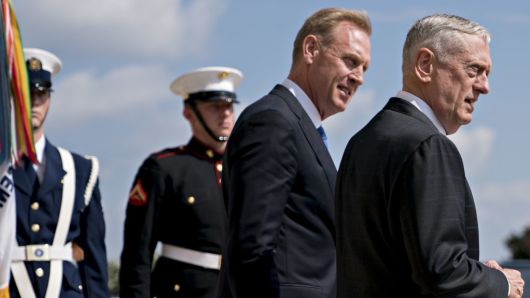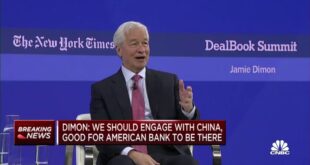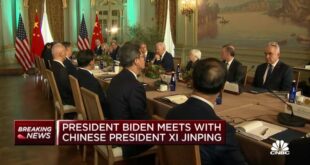
Andrew Harrer | Bloomberg via Getty Images
James Mattis, U.S. Secretary of Defense, right, and Patrick Shanahan, Deputy Secretary of Defense, wait outside the Pentagon before an event in Washington, D.C., on Thursday, Aug. 9, 2018.
After a career in which he rose to oversee Boeing’s supply chain operations as a senior vice president, Shanahan’s new task is more formidable. He will be asked to run a department whose appropriations next year are seven times larger than Boeing’s annual revenue. And he will begin in his new role at a moment of tumult and uncertainty in Washington.
His ascension comes as Trump has pulled the United States back from global commitments and pushed forward on ambitious projects like the denuclearization of North Korea, unsettling allies as well as experts, and raising the specter of a new international balance of power.
The unusual nature of the Trump presidency proved to be too much for Shanahan’s predecessor. In his resignation letter, Mattis said that disagreements with the president about America’s treatment of both allies and strategic competitors came from beliefs that “are strongly held and informed by over four decades of immersion in these issues.”
Mattis, a revered Marine with a military career spanning four decades, was known for his battlefield prowess and kinship with rank-and-file servicemembers. Before he became Trump’s Defense secretary, the four-star general led the U.S. Central Command, the combat command responsible for the wars in Iraq and Afghanistan.
In contrast, Shanahan comes to the role with no experience either in the military or in foreign policy, except for his work in the Trump administration. What views he does have on America’s role in the world have been shaped by his decades in the private sector.
His favorite book, he says, is Freedom’s Forge, a celebration of private industry’s contribution to the World War II effort written by the conservative popular historian Arthur Herman.
“I like that book because it shows what American industry and American government can do when you mix the two,” added Shanahan, who earned advanced business and engineering degrees from MIT. Any “artificial barrier,” he said, is a recipe for delay and added costs.
Shanahan is not the first Trump appointee to take his cues from the business world and apply them to foreign policy.
Trump himself lacked experience in government, and campaigned on running Washington based on the lessons he learned running the Trump Organization and promoted as a reality show host on The Apprentice.
Trump’s first Secretary of State, Rex Tillerson, entered the public sector after serving as CEO of ExxonMobil. The administration has touted the fact that the official leading the administration’s negotiations with North Korea is a former Ford executive. But despite Tillerson’s efforts to streamline the State Department, Trump pushed him out and would later say he was “dumb as a rock and I couldn’t get rid of him fast enough.”
“Privately, he feels the department is not single threaded and tied to one person,” a defense official close to Shanahan’s office said in the wake of the announcement.
“The Department of Defense is a great institution with remarkable talent and he is going to rely on that talent for counsel, experience and expertise,” the official added insisting on anonymity to speak candidly.
 EU News Digest Latest News & Updates
EU News Digest Latest News & Updates



